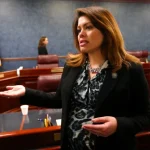

(The Center Square) – Despite a recent audit finding Washington state agencies mishandling more than $1 billion in federal COVID-19 aid, the State Auditor’s Office says it’s not common for federal departments to demand those tax dollars back from the state.
A recent report from the SAO found a record 86 issues with how 11 state agencies spent federal COVID-19 aid, noting documentation deficiencies and $1.17 billion in questioned costs in the fiscal year 2023.
The audit specifically looked at federal money being spent by Washington state government, which in the last fiscal year totaled over $29 billion.
The nearly $1.2 billion in questioned state spending represents about 4.1% of total federal funds spent by the state in the 2023 fiscal year. However, SAO Assistant Director of Communications Adam Wilson noted that it is still uncommon for the federal government to request repayment of mishandled funds.
“In a legal sense, the federal government can request repayment of funds if a state agency does not follow the established federal guidelines, but in our experience that does not occur often,” Wilson told to The Center Square in an email. “Most typically, the federal agency will work with their state counterparts to address concerns raised by an audit finding going forward.”
Each federal granting agency reviews the independent audits of the state programs receiving their respective funds. An example of this would be the U.S. Department of Health and Human Services reviewing the audits of its funds that it provides to state agencies.
Some of the findings in the hefty-sized audit caused some raised eyebrows.
For instance, auditors found the Office of the Superintendent of Public Instruction didn’t properly track subcontractors that received $44.8 million in the 2023 fiscal year because the person responsible for doing so had retired.
Another flagged issue found that staff turnover at the Department of Commerce was to blame for the department’s inability to ensure more than $4.1 million in payments to subrecipients of the Emergency Rental Assistance program were allowable.
Another flagged issue was the Washington state Department of Transportation failing to confirm that its subcontractors were paying prevailing wages.
Contractors are required by federal law to use the Washington State Department of Labor and Industries Prevailing Wage Intents and Affidavit System to submit weekly certified payrolls on federal projects.
If the contractor’s certifications are not submitted in a timely manner, the specifications allow a federal department to withhold payment from contractors and enact other sanctions as necessary.
Of the 245 total certified payrolls submitted, 153, or 62% were not submitted within seven days of the payroll week ending date, as required. On average, the payrolls were 23 days late, and 25 payrolls were more than 30 days late, according to the audit.
WSDOT said it will continue to look for opportunities to improve its process to show compliance with prevailing wage requirements, but noted in the audit that the department is “in the midst of delivering its largest and one of its most complex construction programs in our history, and is doing so with lower and less experienced staffing levels than it had to deliver past construction programs.”
The Center Square reached out to the U.S. Department of Labor to inquire on any potential requests for repayment, but did not receive a response at the time of publication.







